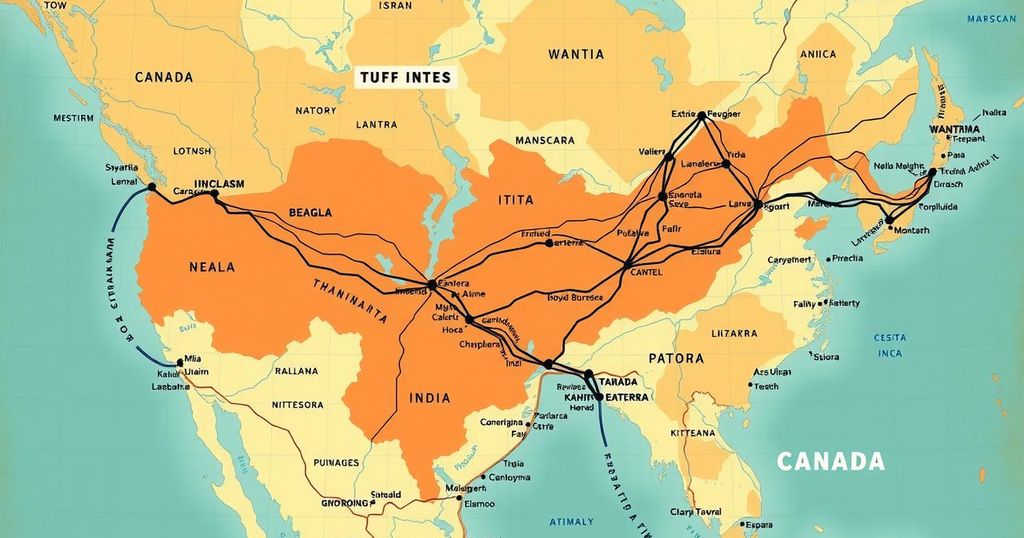The Impact of U.S.-Canada Tariff Disputes: A Closer Look at Trade Relations

The U.S. and Canada are engaged in a tense tariff dispute, with Canada imposing counter-tariffs on U.S. goods due to Trump’s aggressive tariff policies. Despite intensive diplomatic efforts by Canadian officials, public sentiment has turned against Trump as officials seek to assert Canada’s position in response to U.S. aggression. Experts suggest strategic renegotiation is crucial for Canada’s future trade relations.
The ongoing tariff dispute between the U.S. and Canada has garnered international attention, particularly with retaliatory measures from both nations. Initially, President Trump threatened to double tariffs on Canadian steel and aluminum to 50%. However, following Ford’s suspension of an electricity tax, Trump relaxed tariffs back to 25%, indicating a temporary resolution.
In response to Trump’s initial 25% tariffs, Canada announced counter-tariffs on U.S. goods valued at approximately C$30 billion, while the European Union prepared countermeasures against U.S. imports worth €26 billion. Despite the tensions, countries like Japan and South Korea opted against immediate retaliation.
Mélanie Joly, Canada’s foreign minister, forewarned other nations of U.S. tactics: “Watch what Trump is doing to Canada, you’re next.” This statement emphasized the considerable diplomatic efforts made by Canadian officials to avert such a tariff war, which included multiple visits to Trump’s residence and talks in Washington.
Despite these efforts, the situation escalated as Trump imposed additional tariffs, citing issues related to drug trafficking and border security. Public sentiment in Canada has shifted vehemently against Trump, with citizens urging their leaders to take a firmer stance against U.S. aggression.
Provincial leaders like Manitoba’s Wab Kinew and British Columbia’s David Eby underscored this frustration. Kinew humorously mocked Trump while addressing the tariffs and removing U.S. alcohol from stores in protest. Meanwhile, Eby declared his intent to ensure the U.S. recognizes Canadian anger over the tariffs.
Countries, including Mexico, are handling retaliatory tariffs differently, resorting to diplomatic measures rather than public reaction. While Mexico’s President Claudia Sheinbaum received a respite from the U.S. tariffs, Canada finds itself under continued scrutiny and criticism from Trump.
Experts are divided on Canada’s approach, weighing the effectiveness of aggressive retaliation against potential escalated conflict with the U.S. David Collins from City St. George’s University suggests that merely taking a diplomatic path, like Sheinbaum’s, might yield better outcomes in the long term.
Kevin Milligan, an economics professor, contends that Canada must renegotiate the USMCA trade deal urgently to secure its interests, especially following Trudeau’s resignation, which stalled needed negotiations.
Milligan argues that holding firm on specific issues, like electricity, exposes vulnerabilities in Trump’s strategy and can lead to greater leverage in negotiations. This ongoing trade tension highlights the complexity of international relations in the face of unilateral tariffs.
The U.S.-Canada tariff dispute has intensified as both countries adopt retaliatory measures, revealing the broader implications for international trade. Canada’s firm stance and public backlash against U.S. tariffs suggest a shift in domestic sentiment towards stronger government action. As experts debate tactics, it’s clear Canada must renegotiate its trade agreements and approach the situation strategically to safeguard its economic interests against ongoing U.S. pressures.
Original Source: m.economictimes.com





